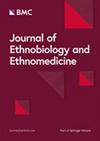揭示乌干达东部布延德地区孕妇和哺乳期妇女中与隐性饥饿有关的禁忌和文化信仰
IF 2.9
2区 医学
Q1 BIODIVERSITY CONSERVATION
引用次数: 0
摘要
孕妇和哺乳期妇女的饮食禁忌和文化信仰影响着她们的饮食消费模式,进而影响着妇女和胎儿的健康。在布延德(Buyende)和撒哈拉以南非洲地区其他资源匮乏的社区,旨在改善孕妇和哺乳期妇女隐性饥饿状况的计划忽视了这些问题,因此我们选择开展一项研究,以揭示这些问题,为计划设计提供参考。我们记录了乌干达东部布延德地区六个县的孕妇和哺乳期妇女的食物禁忌和信仰。我们采用了一种混合方法,包括对 462 名妇女进行问卷调查、8 次焦点小组讨论(每次 6-10 人)以及 15 次关键信息提供者访谈。本研究显示,129 名受访者(27.9%)在怀孕和哺乳期间的饮食习惯方面存在食物禁忌,并恪守与之相关的文化信仰,这助长了隐性饥饿的流行。怀孕期间最忌讳的食物是甘蔗(17.8%),鱼类包括肺鱼、鲶鱼和维多利亚湖沙丁鱼(Rastrineobola argentea)(15.2%),橘子(6.6%),菠萝(5.9%),鸡蛋(3.3%),鸡肉(3.3%)以及木薯、芒果和艳紫铆(各占 3%)。避免食用大多数食物的原因与妊娠和分娩并发症以及对婴儿的不良影响有关。大多数妇女都是从长辈、自己的母亲、祖父母或婆婆那里了解到这些禁忌和信仰的,但在社区内的社会群体中也有知识传播。研究地区的禁忌和文化信仰导致孕妇和哺乳期妇女容易缺乏微量营养素,因为她们被剥夺了食用多种营养食物的权利。有必要教育这些妇女食用鱼、鸡蛋、水果和蔬菜等营养丰富的食物,以改善她们、胎儿和母乳喂养儿童的健康。此外,与文化相适应的营养教育可能是消除对孕妇和哺乳期妇女健康有负面影响的不当食物禁忌和信仰的良好策略。本文章由计算机程序翻译,如有差异,请以英文原文为准。
Unravelling taboos and cultural beliefs associated with hidden hunger among pregnant and breast-feeding women in Buyende district Eastern Uganda
Food taboos and cultural beliefs among pregnant and breast-feeding women influence their food consumption patterns and hence the health of women and unborn children. Cognizant of their neglect in programs aimed to ameliorate hidden hunger among pregnant and breast-feeding women in Buyende and other resource-poor communities in sub-Saharan Africa, we opted for a study to unravel them to inform program design. We documented food taboos and beliefs amongst pregnant and breast-feeding women from six sub-counties of Buyende district in Eastern Uganda. A mixed-methods approach was used, which was comprised of questionnaire interviews with 462 women, eight focus group discussions with 6–10 participants in each and a total of 15 key informant interviews. The present study revealed that 129 (27.9%) of the respondents practice food taboos and adhere to cultural beliefs related to their dietary habits during pregnancy and breast-feeding that are fuelling the prevalence of hidden hunger. The most tabooed foods during pregnancy were sugarcane (17.8%), fishes which included lung fish, catfish and the Lake Victoria sardine (Rastrineobola argentea) (15.2%), oranges (6.6%), pineapples (5.9%), eggs (3.3%), chicken (3.3%) and cassava, mangoes and Cleome gynandra (each at 3%). Most foods were avoided for reasons associated with pregnancy and labour complications and undesirable effects on the baby. Most women learnt of the taboos and beliefs from the elders, their own mother, grandparents or mother-in-law, but there was also knowledge transmission in social groups within the community. The taboos and cultural beliefs in the study area render pregnant and breast-feeding women prone to micronutrient deficiency since they are denied consumption of a diversity of nutritious foods. There is a need to educate such women about consumption of nutrient-rich foods like fish, eggs, fruits and vegetables in order to improve their health, that of the unborn and children being breast fed. Additionally, culturally appropriate nutrition education may be a good strategy to eliminate inappropriate food taboos and beliefs with negative impact on the health of pregnant and breast-feeding women.
求助全文
通过发布文献求助,成功后即可免费获取论文全文。
去求助
来源期刊

Journal of Ethnobiology and Ethnomedicine
PHARMACOLOGY & PHARMACY-
CiteScore
7.30
自引率
16.70%
发文量
66
审稿时长
>12 weeks
期刊介绍:
Journal of Ethnobiology and Ethnomedicine publishes original research focusing on cultural perceptions of nature and of human and animal health. Journal of Ethnobiology and Ethnomedicine invites research articles, reviews and commentaries concerning the investigations of the inextricable links between human societies and nature, food, and health. Specifically, the journal covers the following topics: ethnobotany, ethnomycology, ethnozoology, ethnoecology (including ethnopedology), ethnogastronomy, ethnomedicine, ethnoveterinary, as well as all related areas in environmental, nutritional, and medical anthropology.
Research focusing on the implications that the inclusion of humanistic, cultural, and social dimensions have in understanding the biological word is also welcome, as well as its potential projections in public health-centred, nutritional, and environmental policies.
 求助内容:
求助内容: 应助结果提醒方式:
应助结果提醒方式:


